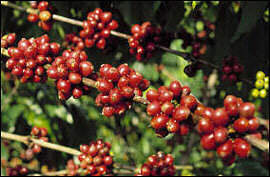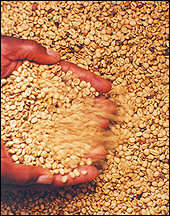 Agriculture: the base of the Ivorian economy Agriculture: the base of the Ivorian economy |

The success of Côte d'Ivoire is based on Agriculture. Indeed, 30% of its GDP comes from agriculture. In this sector, Cote d'Ivoire is getting increasingly involved in modernisation and diversification.
Agriculture has been the bedrock of this country's development. The agricultural production started off with coffee and cocoa and underwent diversification with the passing of time, to attain remarkable development and performance levels. This sector has witnessed the implementation of specific measures and significant structural reforms in recent years in a bid to enhnace its performance.
This includes the establishment of public funds (most of which are intended for agricultural producers), the "turnkey exploitation" project for the youths, the liberalisation and commercialisation of the agricultural sector, and the privatisation of publicly-owned agro-industrial complexes. Between 1990 and 1998, cocoa production rose from 804,000 tonnes to 110,000 tonnes as against 198,900 - 247,000 tonnes for green coffee. Synthetic rubber production rose from 71,482 tonnes in 1990 to reach 100,000 tonnes in 1998.
In the area of animal production, Cote d'Ivoire still experiences a deficit in meat, milk and fish production (i.e. 53%,13% and 33% respectively of its needs are satisfied). In the 1992-2015 agricultural development master plan, the objective was to promote transformation of agricultural commodities with a view to increasing domestic added value, self-sufficiency and food security.
Decreasing the role of the State in production and commercialisation activities to the advantage of private operators is also one of the objectives. This requires that the production sectors be made more professional, the co-operative movement be revitalised and the agricultural sector financed, while promoting the professional agricultural organisations (i.e. organisations professionelles agricoles (OPA)).
Agriculture still witnesses significant progress in terms of satisfying the domestic market which is still growing and still import-dependent, and also satisfying the opportunities offered by regional integration.
Moreover, the diversification policy is aimed at the development of production sectors other than coffee and cocoa and significant progress has been recorded here. From now on, a large percentage of agricultural export will come from timber (log and processed form), canned fish, cotton, rubber, banana, pineapple, oil, sugar and other diverse products. The liberalisation of the coffee-cocoa sector has given rise to the gradual disengagement of the CAISTAB (Commodities Marketing Board) for the benefit of private operators. The new CAISTAB with its private company status carries out major functions such as harvest forecasts, the centralisation of commercial statistics and the promotion of " Made in Côte d'Ivoire " products.
The coffee and cocoa sector was completely liberalised since last August but the prices of these major commodities are plummeting thereby leading to a fall in Côte d'Ivoire's export revenue.
Globalisation offers new perspectives requiring
a system of production that is more pro-active to
market opportunities and quality. It is all about
promoting sustainable development built on the ability
of real professional producers to take initiatives.
The main objective of the reforms that have been
undertaken is to facilitate and transform production
methods especially for smaller producers who remain
an important element in the production and micro
economic cycle, thus allowing them to assume their
own future. Consequently, new companies were set
up for the purpose of marketing and processing agricultural
products. The big names include the Societe Africaine
de Cacao (SACO) which belongs to the Cacao
Burry Group. Cargil,l which has just set up
a packaging outfit in San Pedro (380 km south west),
will process 1000 tonnes of cocoa beans daily . |

With regards to coffee processing, the government's objective is to reach 33% by December 2000 as against the current 24%. Nestlé alone processes 17% of green coffee. As for cocoa, the government's target for the same period is 50% as against 30% at present. Cargill is building a 65,000 tonne cocoa grinding factory in Abidjan, which will become functional by next summer.
Moreover, the Société des produits agricoles de Côte d'Ivoire (PACI) has been acting since 1989 as exporter in this sector. Its Chairman/Managing Director, Alphonse Kouamé is in support that coffee or cocoa beans collected from all the production zones be exported all over the world by product-specific packaging factories in conformity with international standards.
" Last year, we had a turnover of close to 105 billion French francs. This figure corresponds to 11,000 tonnes of cocoa and 2,500 tonnes of green coffee marketed ", he added. PACI products which were traditionally found on the European market, have now started to penetrate the US market. Therefore the company perfectly understands the qualitative requirements of the USA. " The Ivorian product is well known and sought after by all consumers including the United States of America which makes use of a large percentage of our production in its blends " explains Alphonse Kouamé. PACI hopes to expand by completing investments in its first phase activities, and this includes building its coffee making factory with packaging warehouses. It also plans to diversify its activities.
On his part, the Managing Director of COPAGRI, Adou Nioupin affirms that liberalisation and privatisation offers an opportunity to have a foothold on the market as a private operator. "We believe that with the advent of privatisation we are part of the young and professional elite that should be taking over", declares Adou Nioupin. COPAGRI was established for the gathering of agricultural products and rendering marketing assistance to the producers. "We are working with organised bodies in the rural areas, and we are also assisting them to get better organised especially in the coffee and cocoa sector" he adds. COPAGRI aims at rallying all the logistic and financial means available and making these available to farmers through its warehouses. " This allows for the implementation of a proximity policy. We have accounting and business management softwares that enable us to know in real time problems relating to societal development trends" indicates Adou Nioupin. According to him, COPAGRI is one of the few enterprises to have anticipated liberalisation.
In this perspective, COPAGRI is seeking foreign partners from among reliable groups in order to become a major supplier to the international market. "We also have a site which stretches across nearly a 15km seaside beach property, surrounded by several village plantations which provides tourists with a panoramic view of Ivorian agriculture. There is also an airstrip for transporting workers coming from elsewhere". |

